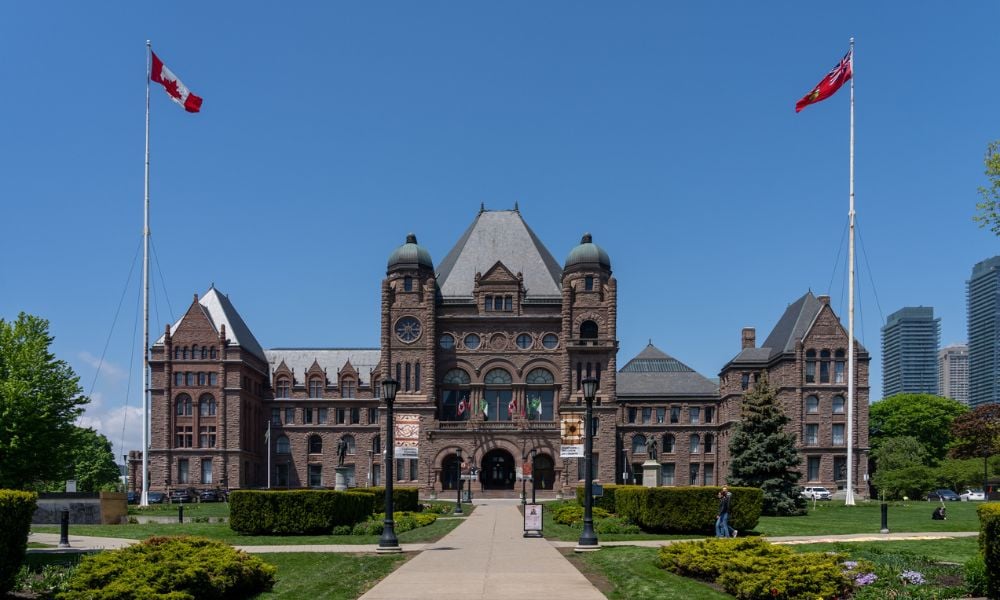By discarding legally enshrined rights to suit his goals, the premier showed his true colours

Ontario Premier Doug Ford just learned that there are political costs to violating constitutional rights. Many Ontarians (including some unions who were burying their heads in the sand) finally realized that they should not have trusted Ford.
Let’s start with broken promises.
In the leadup to the 2021 provincial election, Municipal Affairs Minister Steve Clark promised that the government would not “consider any proposals to remove or develop any part” of Ontario’s protected Greenbelt and would not “entertain any conversations about a land swap.”
But the Conservatives made those promises before the election.
Last week, Doug Ford announced his intention to break that environmental promise by paving over 2,000 acres of Ontario’s most precious and irreplaceable Greenbelt land.
Why pave over paradise?
Ford blames immigrants, saying that Ontario was in a housing crisis, which would only worsen because “the federal government announced they’re going to bring 500,000 new Canadians, immigrants to this country.”
In another affront to democracy, Ford overruled the cities of Hamilton and Ottawa, ordering each municipality to alter their official plans to mandate sprawl development of thousands of hectares of once protected land.
And while Ford was busy doing his best Cyril Sneer impersonation, his lawyers were in Federal court successfully arguing parliamentary privilege shielded Ford from answering questions at the Public Order Emergency Commission.
But all of that was just an appetizer to Ford’s most undemocratic move to date – Bill 28, which prohibited education workers from the Canadian Union of Public Employees (CUPE) from striking, unilaterally imposed an insulting contract and invoked the notwithstanding clause to exempt the unconstitutional law from Charter scrutiny.
This bill was not the first time Ford invoked the Charter’s nuclear option. Ford’s first use of the notwithstanding clause came in June 2021, when he overruled an Ontario Superior Court decision striking down parts of a 2017 election law, which imposed a 12-month third-party advertising blackout before provincial elections.
The Ford government claimed that the unconstitutional election law was necessary to restore responsible electoral guardrails to ensure “wealthy elites” and “corporations” couldn’t drown out the voices of everyday folks. But the reality is that Ford then tried to use the unconstitutional advertising law to muzzle a local community group who opposed the construction of a new jail.
So, Ford’s most recent invocation of the notwithstanding clause is only the latest part of a disturbing pattern of dishonest and undemocratic governance.
As Andrew Coyne wrote for The Globe and Mail, “A Charter that applies only if and when governments decide it should – a constraint that does not bind – is as good as no Charter at all.”
After a groundswell of support for the education workers, Ford agreed to withdraw Bill 28 – but only if the school workers abandoned their job action and returned to the classroom.
It was a classic Ford walk back, which seems like a reasonable compromise until you think about it. There is something profoundly ironic and disingenuous about Ford promising not to act unconstitutionally and force CUPE to give up their constitutionally guaranteed freedom to strike, so long as CUPE voluntarily gives up their constitutionally guaranteed freedom to strike.
But Ford did even more damage with his unconstitutional tactics – he threw raw meat to those who would defend the lawlessness infliction of harm on our communities.
Sun Media journalist Brian Lilley (whose partner, Francesca Grosso, is Doug Ford’s chief of communications) tweeted, “It’s fascinating that so many people supporting CUPE, calling for action, disruptions sound like the folks who headed to Ottawa with the convoy, they want to break the law.”
There is an obvious difference between education workers legally exercising their constitutional rights and the illegal convoy occupation of Ottawa. There is a difference between school workers asking for a living wage and the occupiers’ demands to dismantle democracy. There is a difference between the time-limited use of the Emergencies Act, which triggers a full and transparent public inquiry, and Ford’s admitted unconstitutional legislation that immunizes the government from accountability.
I don’t expect intellectual rigour from Brian Lilley, but his disingenuous comparisons can only embolden the type of people who occupied Canada’s capital city – Ford’s recklessness makes that possible.
Whether it is trampling constitutional rights, avoiding a summons to testify at the Public Order Emergency Commission, breaking environmental promises, or overriding the democratic will of municipalities, this week has shown that honesty and democracy mean nothing to Doug Ford.
This mind frame is Ford’s actual pathology. It is finally time he pays a political price for the damage it causes.











